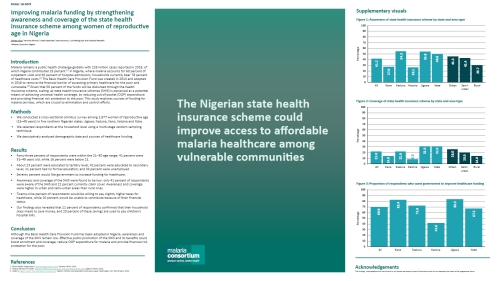
Publication Date:
17/11/2020
Author:
Chinazo Ujuju
Veronica Momoh
Dawit Getachew
Isaac Muonanu
Lola Mabogunje
Kolawole Maxwell
Type:
Poster

Improving malaria funding by strengthening awareness and coverage of the state health insurance scheme among women of reproductive age in Nigeria
Publication Date:17/11/2020
Author:
Chinazo Ujuju
Veronica Momoh
Dawit Getachew
Isaac Muonanu
Lola Mabogunje
Kolawole Maxwell
Type:
Poster
The Nigerian state health insurance scheme could improve access to affordable malaria healthcare among vulnerable communities.
Malaria remains a public health challenge globally with 228 million cases reported in 2018, of which Nigeria contributed 25 percent. In Nigeria, where malaria accounts for 60 percent of outpatient visits and 30 percent of hospital admissions, households currently bear 78 percent of healthcare costs. The Basic Health Care Provision Fund was created in 2014 and adopted in 2018 to remove the financial barrier of accessing primary healthcare for the poor and vulnerable. Given that 50 percent of the funds will be disbursed through the health insurance scheme, scaling up state health insurance schemes is perceived as a potential means of achieving universal health coverage, by reducing out-of-pocket expenditure and providing financial risk protection to the poor. This study explores sources of funding for malaria services, which are crucial to elimination and control efforts.
This poster was presented at the 69th annual meeting of the American Society of Tropical Medicine and Hygiene.
Country: Nigeria
Keywords: Research | Health system strengthening | Malaria | SDGs
« Back to Publications